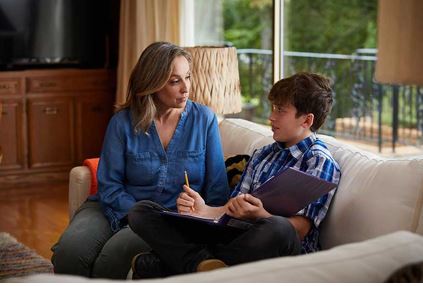Positive Parenting for Challenging Behavior
As a mom of three, I know that when your kids are testing your patience, it’s hard to think clearly in the moment—and even harder to think about what you want your relationship with your child to be like in the future. So what if I told you that there are ways to respond to your kids that could help you develop a stronger relationship, boost their confidence and even help you enjoy being a parent more?
It’s not always easy to do this, but taking a positive approach to discipline (positive parenting) is about teaching your kids rather than simply punishing them. A positive parenting approach does not mean you are completely hands-off, or that you allow them to do whatever they want. You are still the parent. The difference is that when you react to challenging behavior, you keep your focus on providing clear expectations and guidance. At the end of the day, when kids are struggling, they don’t want to give us a hard time—they’re showing us that they’re having a hard time. They need our help.
Again, I’m not saying positive parenting is easy. It takes a lot of practice—and a lot of missteps—before it comes naturally to most people. What I can tell you is, responding positively to our kids can transform our relationships with them.

There is no one right answer or tool, and most of us need to use more than one strategy. Try one or try them all to find what works best for you.
Here are the positive parenting tips I find to be the most helpful in my home:
- Pause, breathe and think before you react. Unless safety is an issue, it’s better to take a moment to collect yourself before reacting. Resetting allows you to respond with reason rather than emotion, and it also shows your kids how to manage emotions in healthy ways. If at any point you feel angry or out of control, it’s OK to take a minute to decide what you want to say and how you want to handle the situation. If you need to, reach out to a trusted family member or friend for help or support.
- Be consistent and follow through. Whatever strategy you use, do your best to be consistent with it. If the rules and limits keep changing, it’s hard for kids to know what the expectations are. At the same time, kids are smart. If they think they can get their way, they are more likely to keep testing you and pushing back.
- Redirect. Sometimes kids misbehave when they don’t know what else to do. When you start to notice your child’s signs (do they get fidgety or rowdy, do they start to intentionally bother their sibling?), try redirecting them or distracting them with something else. For some kids, this may be as simple as offering them something safe to play with or asking them to count all the round objects in the room. If you have older children, try asking them to accomplish a project with you.
- Enforce clear limits. When your child is struggling, be clear about what the limit is. For example, say “You cannot write on the walls” instead of saying “Stop” or “Don’t.” Be realistic and developmentally appropriate. That means that for young kids, keep your explanation straightforward and as simple as possible. Young children need one-step instructions. Asking them to clean up their toys and then clean their room can be difficult for younger children. After all, what does “Clean up your room” mean to a 4-year-old?
- Offer forced choices. After setting a limit for what your kids cannot do, let them know what they can do from two acceptable choices. For example, “You can either color on paper or write in your notebook.” You’re giving them a sense of independence while you still maintain control.
- Use natural and logical consequences.
- Natural consequences teach basic cause-and-effect, based on the child’s actions. For example, if they refuse to bring their toys in from outside, one could get lost or broken.
- Logical consequences occur when you need to enforce a consequence as a result of a behavior. For example, if they misuse technology, you take away the device.
A positive approach to parenting does not mean perfection. No one is perfect (kids or adults). If you’ve made a mistake, try to forgive yourself. You do not have all the answers. If you regret how you handled yourself with your child, don’t be afraid to right your wrong. It’s a valuable lesson for kids to see that their parents are human, too. By showing them how to own a mistake, you are helping build their ability to take responsibility for their actions and develop healthy relationships in the future.
